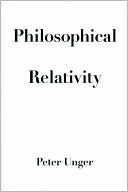

 |

|

The average rating for Philosophical Relativity based on 2 reviews is 2.5 stars.
Review # 1 was written on 2007-09-18 00:00:00 Esteban Mejia Esteban MejiaUnger argues that for a range of expressions ("flat", "empty", "cause", "explanation", "knowledge", etc.), contextualist and invariantist accounts of their semantics are equally viable. Since there are no reasons to prefer one account of the semantics of these terms over the other, Unger concludes that there is no fact of the matter about the semantics of these terms. This is the position he calls "semantic relativity". When the terms in question are philosophically significant (as with "cause", "explanation", and "knowledge"), Unger argues for Philosophical Relativity, which is the view that there is no fact of the matter about traditional philosophical debates that take place around these central expressions, and so no correct way to answer traditional questions about knowledge, skepticism, causation and explanation. It is extremely difficult to establish that contextualism and invariantism are equally balanced, since showing that would require showing that they are both internally consistent, that they both equally mesh with our best accounts of communication, self-knowledge, reasoning, action-explanation, etc. Unger doesn't show that, of course--so his hypotheses of semantic relativity and philosophical relativity are tentatively supported at best. What I found most interesting in this book was Unger's criticism of the use of intuitions to support semantic theories. He gives convincing reasons to think that the use of intuitions to support theories of reference is inconclusive, and gives some variations on classic examples (primarily Putnam's robot cat case) to show that our intutions vary in ways that aren't consistent with causal theories of reference. In that sense, Unger's work anticipates recent work in experimental philosophy that questions the significance of intuitions generated in philosophical thought-experiments. Unger suggests, plausibly, that we can tell a psychological story about how our intuitions vary in different cases that is separate from semantic theory. These kinds of reflections constitute a significant challenge to the standard contextualist method of constructing thought experiments and finding intuitive change in the truth value of utterances in different contexts. |
Review # 2 was written on 2014-11-12 00:00:00 Adam Skirvin Adam SkirvinFine book for beginners of physics background. It did not go so deep into the topic. It explains relativity in chronological order of discoveries and also gives its historical background. Even for people with no background in mathematics and physics, it is interesting in the way, historical facts and concepts are cogently described. |
CAN'T FIND WHAT YOU'RE LOOKING FOR? CLICK HERE!!!